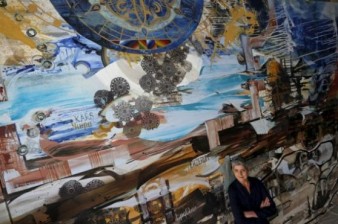
24/03/2015 19:34
Chicago artist marks Armenian genocide with Guernica-size work
One hundred years after the mass killing of Armenians, a Chicago artist has created a monumental painting to honor the victims and celebrate a culture that nearly vanished. Reuters reports.
The 1915 massacre of Armenians by Ottoman troops left up to an estimated 1.5 million people dead and forced the exile of millions more, threatening a 3,000-year-old culture rich in architecture, literature, music and dance. It is widely seen as the 20th century's first genocide.
Seeking to promote awareness of the culture and the tragedy, Chicago-based artist Jackie Kazarian embarked on a painting of enormous scale, called Project 1915, to be displayed for the first time in Chicago's Mana Contemporary from April 17 to May 29.
Project 1915 is a semi-abstract landscape splashed with bold images and text from ancient Armenian maps and church architecture, united by a pattern of needle lace by Kazarian's Armenian-born grandmother and with colors and symbols from illuminated manuscripts.
Kazarian, who has Armenian roots, drew on Pablo Picasso's epic painting Guernica, which depicts the horror of a northern Spanish village's bombing during Spain's civil war, for her painting.
It is the exact same size as Guernica at 11.5 feet by 26 feet.
"No one would have known what happened in Guernica if it wasn't for that painting," Kazarian said.
The nature and scale of the killings of Armenians by Ottoman forces during World War One remain highly contentious.
While a number of countries define the massacres as genocide and while Turkey accepts that many Armenians died in partisan fighting, the Turkish government denies that up to 1.5 million were killed and that this was an act of genocide.
Last year Turkish Prime Minister Tayyip Erdogan made unprecedented condolences to the grandchildren of Armenians killed at the time, but the legacy remains an obstacle to reviving frozen relations between Turkey and neighboring Armenia, a small former Soviet territory.
In Kazarian's paintings, two open hands span the bottom corners, as if holding up the work and an entire culture. It is a gesture Kazarian said she remembers her grandmother often using.
"This is a very visceral, emotional project. But like any art that references a painful past, it is about remembering, healing and educating ourselves to make a better world," Kazarian said.
After its Chicago exhibition the non-profit painting will travel to universities and galleries across the United States and the world before it is donated to a cultural institution for a permanent home.








